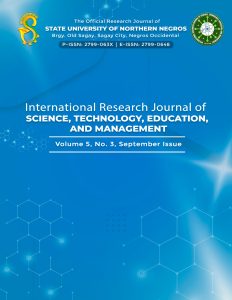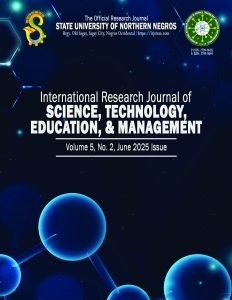September 2025

Impact study of school-based interventions among public secondary schools
Guarin S. Maguate1, Judith S. Rabacal2
1USAT College Sagay City, Incorporated, Philippines
2Professor VI, State University of Northern Negros, Philippines
Full Paper PDF Abstract 1-16
Research patterns on technological inclusivity and equity in higher education: A bibliometric analysis
Prosper Gidisu1, Winston Kwame Abroampa2, Maxwell Kwesi Graves Nyatsikor3
1Department of Teacher Education, Kwame Nkrumah University of Science and Technology, Kumasi, Ghana
2University of Media, Art and Communication, Accra, Ghana
3University for Development Studies, Tamale, Ghana
Full Paper PDF Abstract 17-32
The role of ICT integration on primary school learners’ cognition: A rural education perspective
Buhle Stella Nhlumayo
University of South Africa, Pretoria, South Africa
Full Paper PDF Abstract 33-43
The impact of toxic workplace on employee well-being and organizational outcomes in Lebanon
Dr. Paula Romanos
Independent researcher, Beirut, Lebanon
Full Paper PDF Abstract 44-53
Reflection on the integration of tutorship development programme in one South African University
Sabelo Peter1, Clever Ndebele2
1Faculty of Education, Walter Sisulu University, South Africa
2Faculty of Education, Department of Continuing Professional Teacher Development, Walter Sisulu University, South Africa
Full Paper PDF Abstract 54-65
Land use land cover change detection using Remote sensing and GIS technique: A case study of Addis Ababa, Ethiopia
Reta Birhanu Endale1, Seid Ali Mohammed2
1Assosa University, College of Engineering, Department of surveying Engineering, Ethiopia
2Assosa University, College of Engineering, Department of surveying Engineering, Ethiopia
Full Paper PDF Abstract 66-76
Exploring Digital Test Bank Usability and Acceptability with Productivity Tools: Evidence from the Philippines
Julius R. Satparam1, Agnes M. Reonal2
1,2Bicol University College of Education, Daraga, Albay, Philippines
Full Paper PDF Abstract 77-90

